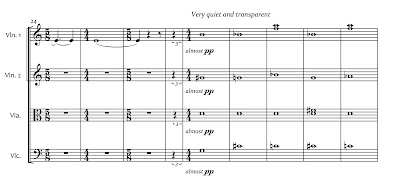
The mainstream view of musical history is not the only one, and its misses a lot of texture, variety, and value. A couple of pieces recently reentered my musical life illustrating some of the slower tributaries of the radical music that have been recently more or less overlooked:
The first was the score to Barney Child's Eighth String Quartet (1974, score excerpt above): not a long piece (marked "7'20" minimum) but with a very slow tempo (quarter +/- 30, but mostly in measure-long notes, many of which tie over barlines). The music is neither especially tonal nor atonal, but the voice leading is clear, often in contrary motion, and nicely contrasts a few isolated long single tones with the sustained semi-consonant "added tone" chords radiating with internal beating, an affect typical of the Southern Californian branch of the radical and minimal music (Childs, a composer I can't help but associate with the southwestern deserts, was also an important teacher, with students including Joseph Byrd and several of the composers associated with Cold Blue records; he was also good friends with that other slow motion mojavan composer, Harold Budd). This is a piece that needs to be performed and recorded.
The second was the news that the recording of Harley Gaber's string quintet The Winds Rise in the North has been re-released. While I don't feel particularly close to the style of this almost two-hour work, which sometimes crosses into an expressive territory that I am tempted to characterize as precious (yes, Virginia, you can be low and glacially slow, and still over-notate), it does illustrate some of the variety and richness of a musical moment in which one of the leading edges was the slow and quiet. The recording of Gaber's quintet was real news in the new music scene when it came out, but, like the composer himself, who moved away from music into tennis and visual arts, has become somewhat eclipsed, a shame because the piece really deserves a new recording.
No comments:
Post a Comment